When Elon University's administration was working to create a School of Law, it didn't want the students walking across the stage to feel like lawyers. It wanted them to feel like more. It wanted them to feel like "lawyer-leaders."
A curriculum embedded with classes on leadership, opportunities for students to gain hands-on experience and speakers who are invested in service have fostered an environment that creates "leader-lawyers," said law professor John Alexander.
"As part of the original vision established for the law school before they set up the school, Elon University and the law school wanted to create something different," Alexander said. "That is why they created an emphasis of leadership development. The school wants to be recognized for graduating lawyers who see themselves as lawyers who will give back to the community and their profession."
During the three-year program, there are two required leadership courses. First-year students are required to take a Winter Term course that focuses on self-awareness. The class is broken into groups that create a firm and then get hands-on experience by utilizing the law school's relationship with the Centre for Creative Leadership.
Students participate in a second leadership class the following year where they are once again put into groups and assigned to nonprofit organizations. Each group helps solve their nonprofit's legal problems. During this process, they do research and present information to the class.
"It's really important for the students to get a chance to break into teams and work with real clients," Alexander said. "We know that most of these graduates will be working in lawyer teams in the future. This is another reason why it is so important that we implement leadership into the curriculum, and help students see how they work in a group environment."
Students also have a chance to gain leadership experience through the leadership fellows program.
"It is a young, new program that is just being developed," Alexander said. "They really help us as faculty and administration, and help us know what does it mean to be a fellow?"
All leadership fellows are required to take the capstone class their third year and complete a project that showcases their skills at that time.
"Basically the first year of inaugural leadership fellows said that we have to kind of come together here because we had been asked to create something out of this program that showcased the 'lawyer-leader' example we have learned," said Jeffrey Koehler, Class of 2012 and leadership fellow.
Several projects were discussed during this brainstorm, many of which later came to fruition. A grocery on wheels project was set up and two boards were created: a pro bono board and a board that brings speakers to come talk to the school. They also decided to create a journal.
The first edition of the Journal of Leadership and Law was published online Oct. 21. The journal explores the role of leadership through interviews with attorneys in leadership positions and articles written by lawyers and students.
Koehler is the editor of the journal.
"Servant leadership is a big thing," he said. "Essentially so many of these articles have shown that as a lawyer or a leader, you exist to help people. The whole goal of leadership, I think, is that when you see there is a problem in the community that you can really get together and help."
Work has already begun on the next journal. In the next issue, they hope to include more student-written content, book reviews from staff members and contributions from prominent leaders.
All students in the law program are expected to become leaders in organizations, do service work in the community and attend speakers.
Students and faculty at the school are working on the next leadership lecture, which will take place in April. Sandra Day O'Connor and David Gergen are returing as the keynote speakers. The law school is partnering with the Centre for Creative Leadership to host the speaker series.


